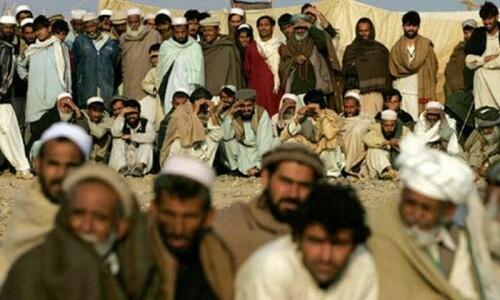PARACHINAR: The Shia community of this small town on Friday suffered twin tragedy when at first 23 people were killed in a car bomb blast near an Imambargah at midday and later another person died after security forces opened fire on a crowd trying to hold a demonstration in front of the political agent’s office in protest against increasing terrorist attacks.
According to reports and eyewitness accounts, an explosives-laden car parked at the women’s entrance of the main Imambargah in Parachinar went off hours before the Friday congregation. The Imambargah and the adjacent mosque are located in the commercial centre of town.
Twenty-three people, including a woman and two children, were killed and 73 others wounded. Later, another person died and seven others suffered injuries when security forces opened fire on a crowd trying to stage a demonstration in front of the political agent’s office in protest against increasing terrorist attacks on the Shia community of Parachinar, multiple sources said.
On Jan 21, a bomb went off in Parachinar’s vegetable market leaving 28 people dead and around 300 others injured.
Officials confirmed the car parked near the Imambargah carried the explosives.
“The car caught fire and tore into pieces,” said Mohammad Tajir, a shopkeeper. “Human body parts and pools of blood were visible at and around the place of the blast. The explosion caused severe damage to shops and residential quarters in the market,” he said.
Coffin-carrying protesters call off dharna after assurances; local administration blamed for security lapse
Many charred bodies were taken inside the Imambargah instead of hospital. However, volunteers soon started shifting the bodies and the wounded in their cars to the agency headquarters hospital.
Survivors described hiding inside shops after hearing the huge bang, then stumbling through dust-choked air filled with the sound of screams, tripping over bodies as they searched for the wounded in the busy market in Parachinar, headquarters of Kurram Agency.
“People were screaming for help... When I looked back everything was filled with dust,” shopkeeper Sardar Hussain said.
He saw his father “drenched in blood and dust”, Sardar said, while the two clients in their shop were lying dead on the floor.
“We closed doors of the shop as we thought there might be a second blast, but we heard gunshots for a while and people were shouting, so we got out,” said Muhammad Ali, a resident at another shop.
Volunteers were seen collecting severed parts of human bodies as security forces rushed to the scene of the attack and cordoned off the area.
It’s Jamaat-ul-Ahrar, again
Jamaat-ul-Ahrar (JuA), a splinter group of the banned Tehreek-i-Taliban Pakistan, claimed responsibility for Friday’s bombing. By contrast, it was Lashkar-i-Jhangvi al Aalmi that owned up to the bomb attack on Jan 21.
In a statement released in Peshawar, JuA spokesman Asad Mansoor said that one of their men had carried out the suicide attack near the Imambargah.
“Abu Darda who carried out the mission in Parachinar belonged to Mohmand Agency,” Mansoor said.
The attack was part of what he called ‘operation Ghazi’ and targeted members of the Shia community who he alleged were involved in the killing of ulema and attack on Madressah Taleemul Quran in Rawalpindi.
Protesters fired upon
After the blast, the market was closed. Announcements were made for blood donors. A group of people proceeded to the office of the political agent to hold a protest demonstration against the incident.
According to the residents, paramilitary and Levies personnel resorted to firing to disperse the mob, killing one person and injuring seven.
This flared tension. Thousands of people carrying coffins took out a procession from the Imambargah and proceeded towards the press club.
They placed coffins on the road and started a dharna. They demanded concrete security measures for Parachinar, a town of 100,000 population, and arrest of the culprits and facilitators who had been targeting the town at will for the past seven years.
Late into night, military and civil officials held negotiations with elders and protest leaders. It was decided at the jirga that an investigation would be conducted to ascertain who was involved in opening fire at the protesters. Also, the elders were assured, an adequate action would be taken against those found guilty. The authorities also assured the jirga that security arrangements for Parachinar would be improved.
Earlier, Haji Asghar Hussain, an elder, blamed the local administration and security forces for the security lapse.
“If the government can’t provide security to the residents of Parachinar then it should give us the right to protect ourselves and the state installations,” said Afghan Hussain. “The border [with Afghanistan] has been sealed and troops have been deployed around the town and yet it’s ironical that terrorists easily carry out bomb blasts,” he lamented.
“Thousands of people took part in the dharna. They had one single demand; give us protection and eliminate terrorists from Kurram Agency,” said Shujaat Hussain, another elder of Parachinar.
The car bomb is the ninth major terror incident in Parachinar since 2007. The administration backed by the army and paramilitary troops has set up a network of checkpoints around Parachinar and elsewhere in Kurram Agency, but these measures have apparently proved to be of little effect as terrorists have been passing through these layers of security quite easily to carry out attacks.
The main hospital in Parachinar lacks the required qualified staff and equipment and therefore was unable to cope with the emergency situation with the result that the seriously wounded people were shifted to Peshawar.
Meanwhile, the Inter-Services Public Relations said in a statement that an army medical evacuation helicopter had been flown to Parachinar for speedy evacuation of the injured.
Dr Sabir Hussain, the medical officer at the Parachinar hospital, told journalists that 70 people were under treatment in Parachinar and 24 had been referred to Peshawar.
Published in Dawn, April 1st, 2017

















































